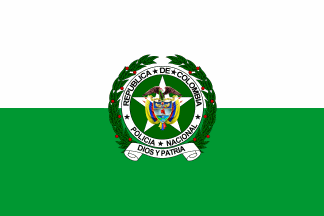
image by Eugene Ipavec, 25 July 2006

Last modified: 2010-02-06 by dov gutterman
Keywords: colombia | police | roundel |
Links: FOTW homepage |
search |
disclaimer and copyright |
write us |
mirrors

image by Eugene Ipavec, 25 July 2006
See also:
The Colombian National Police is currently organizaed as
follows: Dirección General (General Directorate), and 11
Direcciones (Directorates), split into two categories:
OPERATIONAL:
- Dirección Operativa (DIROP, Operational Directorate)
- Dirección Central de Dirección Judicial
(DIJIN, Central Directorate of Criminal Police)
- Dirección Central de Inteligencia (DIPOL, Intelligence Central
Directorate)
- Dirección Antinarcóticos (DIRAN, Antinarcotics Directorate)
- Dirección Servicios Especializados (DIRSE, Specializaed
Services Directorate)
- Dirección Antisecuestro y Extorisón (DIASE, Antikidnapping
and Extorsion Directorate)
ADMINISTRATIVE:
- Dirección Escuela Nacional de Policìa
"General Santander" (EGSAN)
- Dirección Nacional de Escuelas (Schooling National
Directorate)
- Dirección Recursos Humanso (Human Resources Directorate)
- Dirección Administrativa y Financiera (DIRAF, Administrative
and Financial Directorate)
- Dirección Sanidad (DISAN, Health Directorate)
- Dirección Bienestar Social (DIBIE, Social
Welfare Directorate)
Source: <www.policia.gov.co>.
E.R., 27 July 2006
There have been recent chagnes in the Colombian Police lately.
The current Minister of Defense (Juan Manuel Santos) has
announced the creation of a New Directorate. It will be called
Dirección Nacional de Carabineros (Carabineros National
Directorate) and it will be included in the OPERATIONAL category
of Directorates. This change means that an update will be made to
the Corps that take much of the armed action on the Police which
are the Carabineros.
E.R., 18 November 2006
The flag is horizontaly divided flag according profesor Restrepo
Uribe and by several other sources.
Jaume Olle, 3 June 2000
The discussion agrees much with the flags reported in Lupant's
book [lup93] page 57.
Željko Heimer, 24 May 2001
Then flag is horizontally divided one with the Coat
of Arms which reads:
- Republica de Colombia
- Policia Nacional
- Dios y Patria (= God and Country).
Jorge Eduardo Alonso, 25 Febuary 2002
The flag is plain; however most of the times it has the Police
Coat of Arms in order not to confuse it with other Colombian
flags that have the same color pattern (like the flag of the
Department of Antioquia, Department of Vaupes or even the City of Medellin.
E.R., 27 July 2006
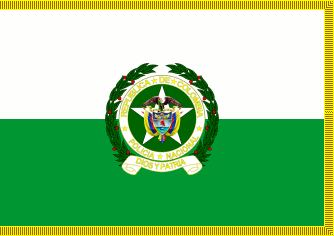
image by Eugene Ipavec, 25 July 2006
.gif)
detail
image by Eugene Ipavec, 25 July 2006
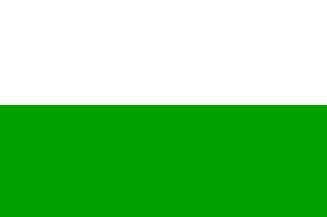
image by Zachary Harden, 28 April 2001
According to <www.esbol.edu.co>,
the flag is plain white over green. Coat of Arms at the same
page.
Dov Gutterman, 18 November 2000
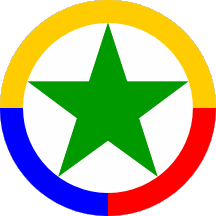
image by Eugene Ipavec, 25 July 2006
pol.gif)
image by Eugene Ipavec, 25 July 2006
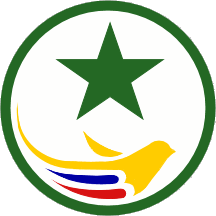
image by Eugene Ipavec, 22 August 2005
In a visit to an Air Show held in Colombia in mid-June 2004, I
came across this particular
aircraft. It seems to be a T-41, operated by the Policía
Nacional Colombiana (Colombian National Police). Its s/n is also
very particular (PNC 0260-I, the "I" standing for
"Instrcucción", or Instruction in English, meaning it
was for training).
E.R., 22 August 2005
The roundel is a dark green ring containing a large dark-green
star over a stylized bird in the colors of the Colombian flag.
Eugene Ipavec, 22 August 2005
I saw this Pennant on
the online edition of the REVISTA
PODER magazine, published on August 9, 2008. I believe it is
the Colombian National Police Director General's Pennat. I
believe the Pennant reads DIRPONAL (Director Policía Nacional),
but I am not sure.
E.R., 29 August 2008
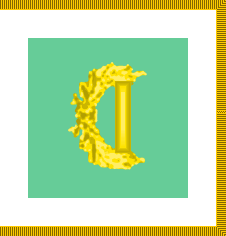
image by Eugene Ipavec, 12 August 2009
This is a Police Rank Pennant feature in the this
picture. This rank Pennant is the rank of Mayor (Major) based
on the rank chart of the Police website here.
Thus we can deduce that all other rank pennants in the Police are
based on the same pattern, the only thing changing is the image
of the actual rank, the color scheme is the same.
E.R., 10 August 2009
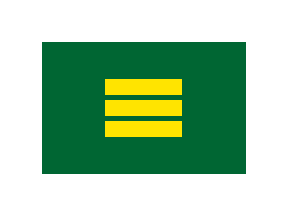
image by Eugene Ipavec, 29 September 2009
This is Police Captain rank pennant based on a picture here.
This picture shows the rank pennant of the Director of the SEJIM
school. On the left side of the picture one can see the obverse a
white rectangular pennant, same size as Army rank pennants with a
white thick outline, then green background with the three golden
bars in the middle which represent the rank of Captain as shown
in their official
website.
E.R., 29 September 2009
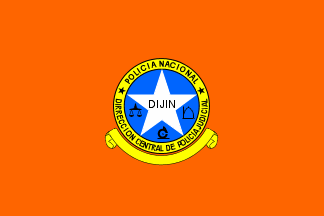
image by Eugene Ipavec, 28 December 2005
The Colombian Police is divided into Directorates. One of the
Directorates is DIJIN, or Dirección Central de Policía
Judicial, Central Directorate of Criminal Police in English.
DIJIN is a national directorate within the Police, with regional
sections in each Police Command throughout the country.
Source: <www.policia.gov.co>.
E.R., 28 December 2005
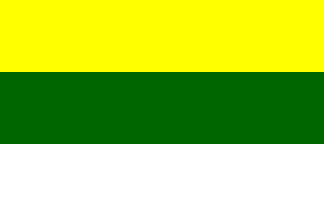
image by Eugene Ipavec, 28 July 2006
.gif)
coat of arms
image by Eugene Ipavec, 28 July 2006
Flag and Coat of Arms at: <www.policia.gov.co>.
E.R., 28 July 2006
Motto is "Thinks About You".
Jorge Candeias, 28 July 2006
The following information is mostly from my trip to Bogotá. I
visited the Police Museum and found some interesting facts:
The Police, among its many Directorates, has a Directorate called
Dirección Nacional de Escuelas (Schooling National Directorate).
It is in charge of the Escuela de Cadetes de
Policía General Santander (or EGSAN). Below the Escuela de
Cadetes de Policía General Santander (which is located in
Bogotá and it's the main Police School), there are the different
school branches located all around the country (not only for
cadets, but also aviation, equestrian, and other police
branches). They are (in no particular order of importance, only
in alphabetical order):
All of the above mentioned schools have their own Coat of Arms
and flags.
E.R, 11 August 2006
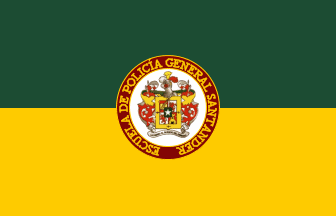
obverse
image by Eugene Ipavec, 2 October 2005
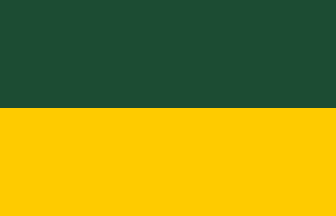
reverse
image by Eugene Ipavec, 7 March 2006
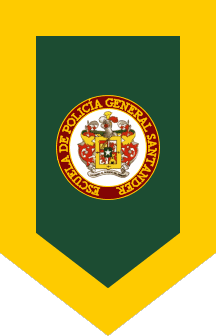
pennant
image by Eugene Ipavec, 14 October 2009
Flag of the "Escuela de Cadetes de Policía General
Santander" (General Santander Police Cadet School).
Description of the flag: two equal horizontal stripes, top green
and bottom yellow, with Coat of Arms on the middle. Official
website: Dirección
Escuela Nacional de Policía General Santander.
E.R., 22 September 2005
There seems to be a gold inscription in the burgundy ring
around the arms, but it's far too small to be legible. The name
of the school, perhaps, or its motto?
Eugene Ipavec, 22 September 2005
The inscription on the golden fringe is the name of the
School, so it would be (in golden capital letters) "ESCUELA
DE POLICA GENERAL SANTANDER".
E.R., 2 October 2005
I observed the General Santander Police Cadet School
Pennant/Guidon at a military parade held on July 20, 2009 on the
Municipality of Tame,Department of Arauca. There's an image
gallery where you can see the Pennant/Guidon of the School on
the instruments of the marching band during the parade.
E.R., 14 October 2009
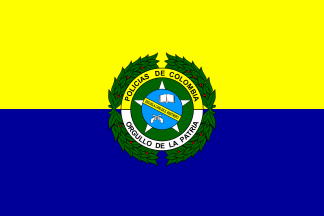
flag
image by Eugene Ipavec, 11 August 2006
.gif)
coat of arms
image by Eugene Ipavec, 11 August 2006
Escuela Carlos E. Restrepo (SERES), located in La Estrella, Departamento de Antioquia.
Source: <www.policia.gov.co>.
E.R., 30 August 2006
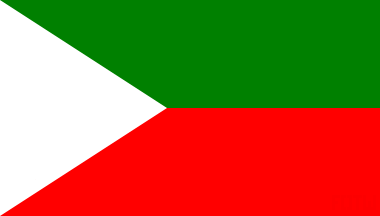
flag
image by Eugene Ipavec, 30 August 2006
.gif)
coat of arms
image by Eugene Ipavec, 30 August 2006
Escuela Rafael Reyes (SEREY), located in Santa Rosa de
Viterbo, Department of Boyacá.
Source: <www.policia.gov.co>
E.R., 30 August 2006
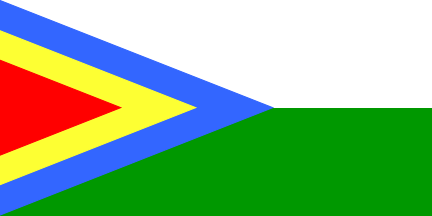
flag
image by Eugene Ipavec, 31 August 2006
.gif)
coat of arms
image by Eugene Ipavec, 30 August 2006
Escuela del Sumapáz (SESUM), located in Fusagasugá Department of Cundinamarca.
Official website: <www.policia.gov.co/sesum.nsf>.
It was created by Resolution No. 6192 of the 23rd of December,
1996 and it was inaugurated on the 10th of December, 1997.
Flag was created by Resolution No. 03368 of November 20th, 1997.
The flag is based on the colors of the flag of the Department of Cundinamarca inside on a triangular shape,
inside the colors of the Colombian Police flag.
Coat of Arms was created in 1998 by a group headed by Lt. Col.
Ómar Francisco Perdomo Guevara, then Academic Vice-Director of
the school. It has four flags surrounding the Coat of Arms
itself: on the left-hand side the Colombian Police flag and more
to the outside the Colombian flag. On the right-hand side the
Department of Cundinamarca flag and more to the outside the
Colombian flag.
E.R., 30 August 2006
This is the translation of the organization of the Police in
Colombia (translated from the official website, original version
in Spanish at <www.policia.gov.co>):
The Colombian National Police is organizaed on the national level
based on the geographical division of the country (that is
Departments and main Metropolitan Areas when referring to the
main cities). It is comprised of a "Comando de Departamento
de Policía" (or Police Department Command, which is the
Police organization established in each of the 32 Departments of
Colombia). Plus, the Police has three Metropolitan Commands for
the three main cities: Bogota, Medellin and Cali.
In administrsative terms, these Commands depend solely on the Dirección
Operativa (Operations Directorate)
All Police Department Command of the 32 Departments of Colombia
have same flags besides the name of the department. The first
official flag is the Colombian tricolour, charged with the
Colombian coat of arms over a white star, and a maroon circle
around reading on top POLICIA NACIONAL, and on the bottom DEPTO.
(abbreviation for DEPARTAMENTO) * POL (abbreviation for POLICIA)
and the name of the Department.
The second official flag is the Colombian National Police flag,
charged with the Colombian coat of arms over a white star, and a
maroon circle around reading on top POLICIA NACIONAL, and on the
bottom DEPTO. (abbreviation for DEPARTAMENTO) * POL (abbreviation
for POLICIA) and the name of the Department.
Regarding the flags of the three Main cities Metropolitan
Commands, I have not seen them, but I do know they exist.
Below are examples of the two official flags from two
departments.
E.R., 27 July 2006
Note that the inscription in and border of the maroon ring are
gold on the Colombian tricolor flag and and silver on the
white/green bicolor.
Eugene Ipavec, 28 July 2006
I saw a Police patrol that belongs to the Policía
Metropolitana del Valle de Aburrá
(Aburrá Valley Metropolitan Police) which is one of the three
Comandos de Policía Metropolitana (Metropolitan Police
Commands). The flag of the Comando de Policía Metropolitana del
Valle de Aburrá has the same scheme as the Comando Departamental
with the only difference being on the Coat of Arms, the lower
part of the red circle having the words METROPOLITANA VALLE DE
ABURRA.
E.R., 31 July 2006
Comando Departamento de Policía de Amazonas
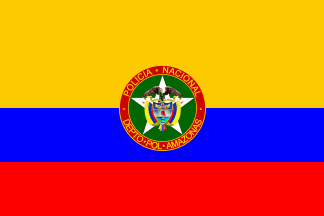
image by Eugene Ipavec, 27 July 2006
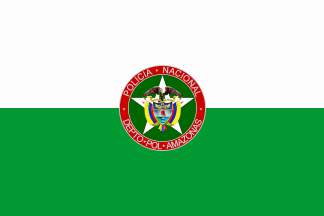
image by Eugene Ipavec, 27 July 2006
.gif)
coat of arms
image by Eugene Ipavec, 27 July 2006
Comando Departamento de Policía de Córdoba
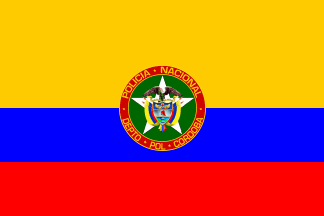
image by Eugene Ipavec, 27 July 2006
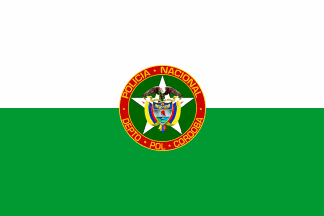
image by Eugene Ipavec, 27 July 2006
.gif)
coat of arms
image by Eugene Ipavec, 27 July 2006
Policía Metropolitana del Valle de Aburrá
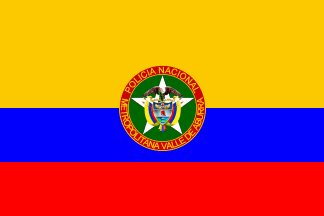
image by Eugene Ipavec, 31 July 2006
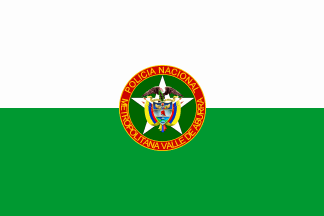
image by Eugene Ipavec, 31 July 2006
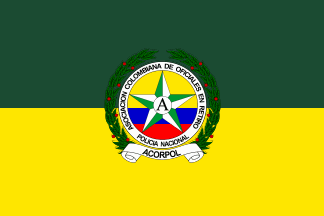
flag
image by Eugene Ipavec, 26 July 2006
.gif)
coat of arms
image by Eugene Ipavec, 26 July 2006
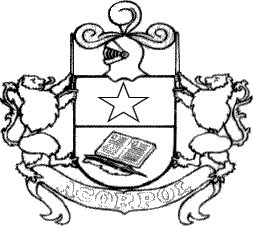
proposed coat of arms
image by Eugene Ipavec, 23 July 2006
The flag of the ACORPOL (Asociación Colombiana de Oficiales
en Retiro de la Policía, or Colombian Asociation of Retired
Police Officers). The information is based on a magazine,
published in March, 2006, by this asociacion, in which it
portrays the flag, the Coat of Arms and a proposal for a new Coat
of Arms.
The flag has the same bicolor color scheme as the General Santander Police Cadet School plus the
Coat of Arms on the middle. The green color stands for hope and
the yellow color stands for richness.
This was a proposal sent in August 1985 and published my the
Asociation's magazine, made by Lt. Col. (r) Alberto Bernal
García (deceased), of the ACORPOL office in the Departmento of
Valle, making a call to upgrade not only the Coat of Arms but
also the anthem and the flag. The proposal was published in the
magazine Carta Policial, Edition No. 49,
August-September issue of 1985.
E.R., 23 and 26 July 2006